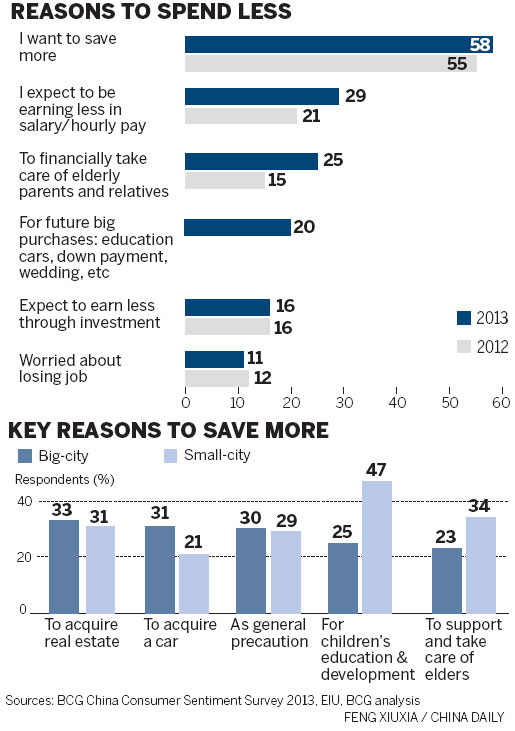Consumer spending weakens
Updated: 2013-06-25 07:41
By Zheng Yangpeng (China Daily)
|
||||||||
Smaller cities feeling the pinch of economic slowdown, says report
Chinese consumers are planning to spend less as their confidence in the economy falls, and shoppers in smaller cities especially are showing an unexpected reluctance to splash the cash, according to a report by The Boston Consulting Group released on Monday.
While what looks like a healthy 27 percent of Chinese consumers said they planned to spend more in 2013 - a percentage much higher than in developed economies - the figure was still an 11 percent drop from last year's 38 percent, said the study, which was based on an April poll of 1,000 consumers in 12 Chinese cities.
BCG said the drop was driven, in large part, by China's weakening GDP.
Last year, close to half of consumers said the economy would improve within the next 12 months, but this year's report said that figure is now 38 percent.
And while intent on spending less, Chinese consumers are also planning to save more.
The household savings rate in China reached a historic high of 38 percent of disposable income in 2012, compared with 23 percent 10 years ago, the report said.
Asked about why they wanted to save more, consumers said they wanted to support their family, or purchase expensive goods such as houses and cars.
But the main reason given for the growing reluctance to spend money, said respondents, was China's soaring property prices which were exerting a significant "squeeze" on other spending.
Some 34 percent of people not owning a property said they planned to spend less, while of those owning property, only 27 percent said they would do so.
Those planning to buy a house in the next 2 to 3 years said they were now more likely to scrimp and save, with 39 percent saying they planned to spend less as a result.
In contrast, just 31 percent of people not planning to buy in the next 2 to 3 years said they planned to cut their spending.
"As long as home prices in Chinese cities, especially major cities, do not ease, Chinese consumer spending will not see a big rise," said Jeff Walters, a partner and the managing director of BCG Greater China, who added he was not surprised by the growing frugality of consumers in bigger cities.
The survey found the most careful shoppers are now middle-class, affluent consumers in small cities, with respondents willing to spend more decreasing 19 percentage points over last year to 23 percent.
In comparison, there was just a 10 percent fall in the spending plans of ordinary consumers in small cities and for ordinary consumers in larger cities, the drop was 6 percent.
"Until recently, the much-coveted middle-class and affluent consumers in lower-tier cities were relatively immune to the economic crisis, owing to their lower cost of living. Their optimism made them the most attractive consumers segment in the country," said Walters.
"But now, the tide has begun to turn and the decline in larger cities is bottoming out.
"Consumers in smaller cities, however, are finally feeling the pinch of the domestic slowdown," he said.
While consumers in big cities scrimp mainly to buy property and cars, their counterparts in smaller cities save more out of concern for supporting their children and elderly relatives in what is being seen as a less-than-stable social-welfare system, the report showed.
"Small cities have more private entrepreneurs and SMEs, who are more sensitive to economic fluctuation.
"More people working for the public sector in small cities, and China's recent government-led frugality campaign had a larger impact on them," added Yunling Zhou, a principal in BCG's Beijing Office.
"What's more, consumers in smaller cities have a heavier family burden and a more traditional mindset."
However, researchers said that weakened consumer sentiment might be good news for some companies.
While total spending is down, consumers are becoming more sophisticated shoppers making better use of their budgets.
A huge 80 percent said they are buying fewer, but better-quality items. Shoppers are also becoming smarter, researching purchases on the Internet before buying.
Brand names with good reputations, as well as products and services associated with good health, such as babycare, skincare, and nutritional items, are well-positioned to benefit from the changing spending habits.
But producers of goods that are considered to be superfluous, such as luxuries, restaurants and chocolates, must adapt to conditions and make the offerings more appealing, the report suggested.
Researchers said they did not find a great deal of pessimism regarding the country's long-term economic development, however, with only 11 percent of respondents agreeing that "the economy will not improve within the next several years".
BCG said that the current dip in optimism was short-term, and that increased levels of saving should not overshadow an overall bright future in China.
zhengyangpeng@chinadaily.com.cn

(China Daily USA 06/25/2013 page16)

 Philippine, US start Naval exercise in S China Sea
Philippine, US start Naval exercise in S China Sea
 Supreme Court gay rights ruling celebrated across US
Supreme Court gay rights ruling celebrated across US
 Rudd returns as Australian PM after Gillard
Rudd returns as Australian PM after Gillard
 Brazil protests intensify before Confed Cup semifinal
Brazil protests intensify before Confed Cup semifinal
 Long lost weekend
Long lost weekend
 Park ready to charm China
Park ready to charm China
 Prices climb as police crack down
Prices climb as police crack down
 China 'most promising' in FDI
China 'most promising' in FDI
Most Viewed
Editor's Picks

|

|

|

|

|

|
Today's Top News
Proposed law puts curbs on family visas
Markets will stay volatile, continue to struggle: Expert
Promising outlook on US, China investment
US adoptees visit Chinese roots
Ecuador refutes Washington Post accusation
IBM to make Chinese job cuts
PBOC ends credit crunch, to go further
Snowden still at Moscow's airport, asylum pending
US Weekly

|

|







